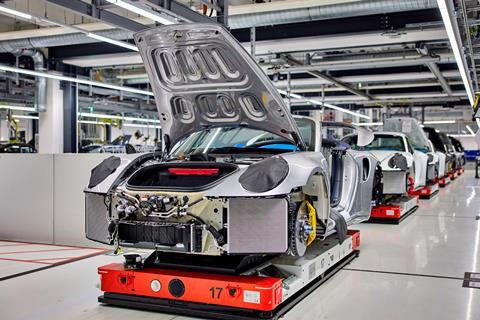[Update Nov 23] Porsche is investing €250m ($272m) to upgrade its main plant in Stuttgart-Zuffenhausen, increasing capacity and flexibility in the production of combustion-engine and electric sports cars. The upgrade includes the latest automated guided vehicles (AGVs), additional logistics areas and a new high-bay rack.

The carmaker plans to make the next 718 generation EV on the same assembly line as its two-door sports cars. Assembly of the electric powertrain for what will be the electric Macan is also being integrated into the existing engine plant.
Porsche said it has extended the production line area for its two-door sports cars at the main plant and introduced the use of AGVs on a ‘Flexiline’ to replace the classic assembly process, a move it said enabled an even more variable production process in support of mixed production on a single line. The new AGVs are manufactured by Daum + Partner Maschinenbau (DPM). Porsche is using 23 AGVs on the production line, with 21 units used in daily operations and two units purposed for service and maintenance.
The carmaker already uses AGVs for the production of its electric Porsche Taycan.
”The new AGVs can be considered as an evolution of the existing units already in service at Taycan production,” said a spokesperson for Porsche. The new features that the Flexiline AGVs have include a greater electric range and battery capacity, as well as a charging system that is both stationary and inductive on the move.
Porsche is also using 18 AGV units for its engine and electric powertrain assembly (with two reserved for service and maintenance). Those AGVs have optimised turning and cornering capabilities, with the ability to turn 360 degrees on the spot and rotate units at the engine wedding station. The AGVs can also be synchronised and rotated using a QC code.
“The reconstruction measures and extensions to sports car production at our main plant are an important milestone for the Zuffenhausen site,” said Albrecht Reimold, head of production and logistics at Porsche. “The conversion measures will enable increased efficiency, the highest quality standards, and mixed production of combustion-engine and electric sports cars. This will see us start a new chapter in sports car production in terms of the smart factory.”
More logistics capacity
Porsche said it has been extending the logistics areas within the body shop since 2022, adding a new building at the site of the former Porsche Centre on Porscheplatz across from the Porsche Museum. There is has extended the vehicle body storage warehouse by five racks, again with fully automated racking technology. The warehouse is now has storage capacity for 6,600 units. This replaces an existing vehicle body storage facility in Kornwestheim, a suburb of Stuttgart), and has therefore reduced the use of truck transport.
The company also installed a new high-bay rack, which went into operation in September this year and is already supplying the entire assembly plant with various vehicle components. The high-bay rack is automated and has a 35,000 cu.m stroage capacity for 4,650 pallet spaces, with a maximum of 1,000kg per space. The racks have 20 levels and are built along two alleys.
Other upgrade work includes newly established quality assurance stations. Standardised quality assurance and approval checkpoint points have been integrated into the production process. To ensure optimal vehicle inspections, a range of processes were adapted to optimise vehicle inspections and a new light tunnel has been installed.
This year the carmaker is celebrating 60 years of making the Porsche 911 and 75 years of Porsche sports cars.

























![Global[1]](https://d3n5uof8vony13.cloudfront.net/Pictures/web/a/d/s/global1_726550.svgz)














No comments yet